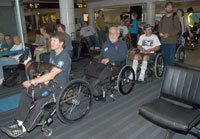It's been a long time coming. The American Association on Mental Retardation, founded in 1876 (and then called the Association of Medical Officers of American Institutions for Idiotic and Feebleminded Persons), voted overwhelmingly last month to change the organization's name to the American Association on Developmental and Intellectual Disabilities.
AADID President Valerie Bradley said the change was driven mainly by individuals with developmental and intellectual disabilities who are part of the self-advocacy movement and dislike the term "retarded" because of the stigma connected to it. Ragged Edge has the story on the vote and the name change trend.
For the last year or two, I've closely followed any use of the terms "retard," "retarded," and "idiot" I've seen in the blogworld,
sometimes speaking up but often just
observing the commentary. Even just limiting my surveillance to the feminist blogosphere, there's been
perjorative aplenty with opinions about the appropriateness/offensiveness of these terms varying widely. While nondisabled folks are busy debating what's offensive, whether language should be policed, and if a past medical term can legitimately be considered pejorative now, the name change at the AADID means that the organization is responding to the activism of the people it's designed to serve.
Here's a little history on some of the pressure people with developmental and intellectual disabilities applied to urge the name change: "Self-advocacy" usually refers to the civil rights efforts of people with developmental and intellectual disabilities as they speak for themselves, since historically they've been institutionalized and not considered capable of participating in decisions about their lives.
SABE (Self Advocates Becoming Empowered) is a national self-advocacy organization. In February of 2005, SABE was one of eleven organizations planning to gather that fall for a summit as the collective
Alliance for Full Participation, but instead SABE lodged
a complaint to the other ten, written by Chester Finn:
[Our] executive committee met twice and decided that SABE will no longer be a part of the AFP and SABE will not participate in the Summit because of the ongoing problems of not being treated with respect and because [other AFP members] went back on their word. What kind of problems did we have? There were three major problems. First, some of the AFP members were not respectful toward the SABE board members. We did not feel like we were really being heard.... Second, our level of participation was not as interactive as what SABE wanted.... Third, some of the AFP members decided to not honor our verbal agreement [to waive our Summit fee] and requested the $5,000.
The response, written for the group by Steven Eidelman,The Arc's executive director, was apologetic and hopeful:
We regret any miscommunications or misunderstandings, and we hope that our partnership can begin again. The leadership of the Alliance for Full Participation is absolutely hopeful that reconciliation with SABE can be reached, and we will continue to work to achieve this outcome. Should this not occur, the AFP is committed to ensuring that the voice of self advocates is heard at this Summit.
Finn's elegant answer to the apology consisted of ten demands -- one for each organization committed to helping disabled people -- beginning with the ultimatum that the AAMR change its name:
If the Alliance or individual organizations really want to work with us, they need to do the following:
1. AAMR needs to stop using the word mental retardation and change their name. SABE worked with the President’s Council for People with Intellectual Disabilities to change their name. In the Civil Rights movement, the “N” word was hurtful to African Americans. Likewise, the “M” word is offensive to individuals with intellectual and other developmental disabilities. SABE challenges AAMR to educate their members in order to change their organization’s name.
and, in summary:
SABE is willing to work with you on these issues. If you really believe in our issues and you want to win back our trust, you will join us at the table in achieving the goals of closing institutions and nursing homes, self-determination, individualized services, selfdirected supports, and money following the person. All of these goals are related to making real lives for persons with disabilities.
And once again,
in flyer form, SABE reiterates:
We have told you what is important to us
Get rid of the infamous and hurtful “r” word, do not label us
We will not put up with
The “r” word continuing as part of an organization’s name
even as initials
If you are working with me and for me then do not disrespect me
Apparently, one result of this activism was the name change from AAMR to AADID. Of course, the reference to the "r" word being present in an organization's initials refers to
The Arc. Although the full name is no longer used, the acronym does still stand for The Association for Retarded Citizens.





